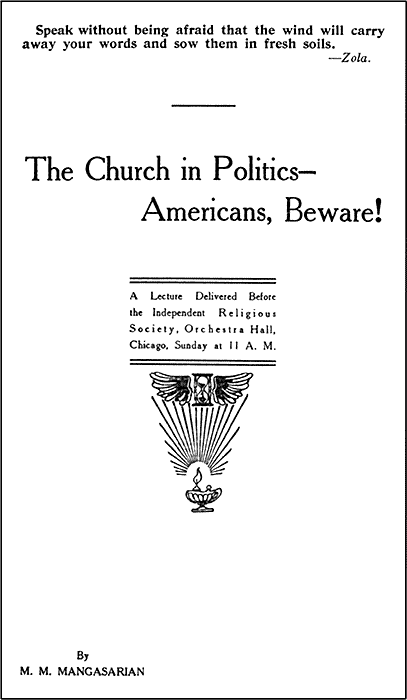Speak without being afraid that the wind will carryaway your words and sow them in fresh soils.
—Zola.
The Church in Politics—
Americans, Beware!
A Lecture Delivered Beforethe Independent ReligiousSociety, Orchestra Hall,Chicago, Sunday at 11 A. M.
By

The mass of the law-abiding and respectable citizens is virtuallyagnostic. Where its agnosticism is not reasoned out, it is habitual andunconcerned. The orderly, honest, duty-doing people who never thinkabout religion one way or the other form by far the largest class in thecommunity.
—David Christy Murray.
The Church in Politics—
Americans, Beware!
In his letter on religion in politics, President Roosevelt takes theposition, I believe, that we may look forward to the day when aCatholic, for instance, may be nominated and elected to the presidencyof the United States of America. He also intimates that to refuse tovote for a Catholic on account of his religion would be bigotry! TheLutheran, Baptist and Presbyterian bodies have, if I am not mistaken,officially protested against the president's pronouncement. TheseProtestant churches declare that it is not fair to call them bigots forobjecting to a Catholic for president.
Speaking only in the capacity of a private citizen, it is my opinionthat, according to the Constitution, a Catholic is not eligible to be acandidate for president. Neither is a sincere and consistent Christianof any other denomination. Nor is a believing Jew. The Constitutionexplicitly ignores the religious interests of the nation; it does noteven so much as mention the name of God. Had the document been createdby infidels it could not have been more indifferent to the subject ofchurch or religion. The Constitution is a downright secular instrument,having as its end one, and only one, object—the rights of man. But thesupreme end of the church is God, not man; or man for God. There isthen, between the church and the Constitution, an irreconcilabledifference. It is because of this that the United Presbyterians, forinstance, who have a membership of about a million, refuse even to takepart in elections, much less to accept office under a government thatdeliberately ignores the Christian religion, as well as every otherreligion. I submit that the United Presbyterians are quite consistent,and that they deserve the respect of all[4] who hold that courage andsincerity are better than ambiguity and inconsistency. A Christian,therefore, can accept a nomination to the presidency, for instance, onlyby either stultifying himself and belittling his church, or bydisregarding the Constitution, its spirit as well as its letter.
Nor would it be "bigotry" to contend that a Protestant or a Catholiccandidate, to whom God is first and country second, should under nocircumstances be voted into presidential power and influence. Even as itwould not be an act of intolerance to deny the presidency of thiscountry to a foreign-born citizen, it would not be intolerant to deny itto Catholics, for example. They are simply not eligible. Both Protestantand Catholic ought to say, when invited to the office, that they can notconsc